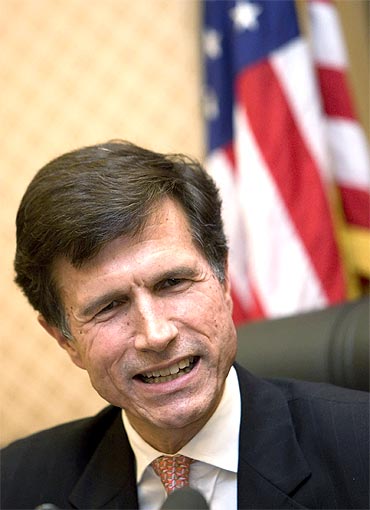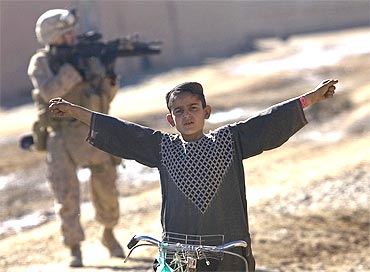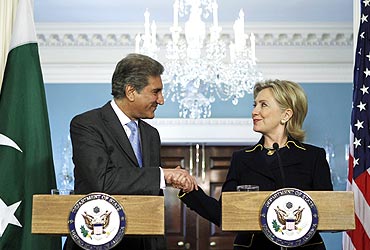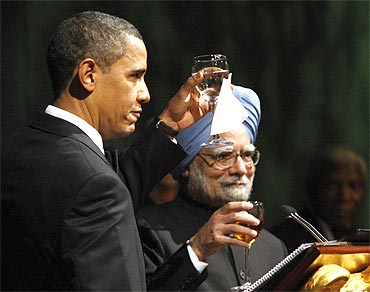 | « Back to article | Print this article |
Growth of India 'is much in US' interests'
United States' Assistant Secretary Robert Blake on Wednesday marked the beginning of the US-India Cabinet-level Strategic Dialogue in Washington, DC, and elaborately discussed bilateral ties and issues like counter- terrorism, education, agriculture, trade and climate change. In his opening message, Blake said that US President Barack Obama feels that it's very much in American strategic interests to help advance the growth of India on the world stage.
Excerpts from his interactions with mediapersons:
Can you give us an update on what's going on in Washington with the Strategic Dialogue? How does this matter to the people in India or the United States?
It matters to the people of India and the people of the United States because we're going to be focusing not only on important bilateral issues that directly affect your security and prosperity, things like counterterrorism, which is so important to the security of both Americans and Indians.
But also very important issues like developing crop and weather forecasting. We're looking at ways to improve the supply chain in agriculture. We're looking at ways we can participate in improving agriculture in other countries.
We're looking at ways to improve trade and investment, which already has doubled over the last five years. But we have great optimism that we can do much more in the years to come. So all of those will bring concrete and immediate benefits to the people of India and the United States.
And also I think we'll be looking at these important global issues as well. About how the United States will cooperate on the global stage on important matters like climate change, food security, and nonproliferation.
What are the major policies that India and the US are focusing on? Can you elaborate?
Well, I think I mentioned some of those. Let me talk about the economic part of it. Jobs are a very important part of the future both for the United States and for India. There are a number of very important milestones, I think, that will be coming up in our relations.
One is the pending civil nuclear legislation, liability legislation, in the Lok Sabha which would open up the possibility of American companies exporting reactors and other civil nuclear technology to India to help meet India's very fast-rising energy needs.
Another important growth area is education where there's another bill pending that will open up India's education sector for the first time and allow American universities to come in and offer degrees to Indian students. That will be in addition to the 100,000 India students already here in the United States. So those are just two of the very promising areas of new cooperation between the United States and India.
Click NEXT to read further..
'US ready for any counter-terrorism assistance'
One of the topics of the Strategic Dialogue is counterterrorism. While I assume this refers to Pakistan and Kashmir-based groups like Lashkar-e-Tayiba, Prime Minister Singh has called the Naxals the greatest internal security threat. How would you say the Maoist threat affects US interests in India?
I think that counterterrorism cooperation is one of the fastest-growing and most important areas of our cooperation now. All of America was horrified to see the attacks that took place in Mumbai in November of 2008, and I think that was really a turning point in many ways for what became much closer counterterrorism and intelligence cooperation between our two countries to help counter this threat.
Not only from Lashkar-e-Taiba, but from many other groups that are targeting India and the United States. So I'm very pleased with the cooperation to-date. Our Federal Bureau of Investigation Director Robert Mueller will be part participating in our dialogue on Thursday with Secretary Clinton and other cabinet ministers, and I'm sure there will be more to say on that subject.
With respect to the Naxal threat, certainly that's one of the primary threats facing India right now and I know it's a very, very high priority for Prime Minister Singh and Home Minister Chidambaram. At this point, the India government has not requested any assistance from the United States, but certainly we would be prepared to entertain any requests for any assistance, given our fast-rising cooperation on counterterrorism.
India is facing a growing burden of non-communicable diseases and it is way behind in tackling it. Do we see any assistance from the US in the area of health?
Health has been one of the long standing areas of cooperation between the United States and India. The United States still has an assistance program in India devoted primarily to helping in the area of health.
Not only with some of the communicable diseases that you talked about, but important new challenges like HIV/AIDS. And, again, we think that there's been very strong cooperation to date. We now want to take that to the global level as well.
So that's why our two leaders-- Prime Minister Singh and President Obama-- agreed to establish a global disease detection center in India where our scientists will be able to work together to look for the cures to some of these most deadly diseases and look at ways that, again, we can work together to not only address some of the challenges inside India, but also some of the challenges like polio in other countries.'US won't succeed in Afghan without Pak help'
There is a big concern in India over the Afghan exit strategy of the Obama administration. I am told that this issue will figure prominently during the Strategic Dialogue. The intelligence agents of the Pakistani Army continue to harm not only Indian interests but also US interests. How do you view Pakistan's role in Afghanistan, and do you think that the Pakistanis are honestly assisting the international community in fighting the terrorist elements? Is the U.S. administration convinced that sidelining India from forums relating to Afghanistan and appeasing Pakistan will help stabilize the situation in Afghanistan?
First of all, with respect to the situation in Afghanistan, President Obama and Secretary Clinton were very pleased to welcome President Karzai of Afghanistan to Washington several weeks ago in which they had a very wide-ranging discussion with President Karzai and several members of his cabinet, who were here for their own strategic dialogue with the United States.
And I think one of the most important results of those discussions was the pledge by President Obama that the United States will remain committed to the future stability and prosperity of Afghanistan for years to come. We are involved now in a very important mission with many of our NATO partners to help train up the Afghan security forces and the Afghan police so that they can begin to take responsibility for their own security.
But even after our own forces begin to transition away as Afghan forces begin to take charge of their own security, we will have a long-term development assistance strategy in place for many years to come to help the Afghan economy develop and provide opportunities for young Afghans to work in agriculture and increasingly in other areas of the Afghan economy.
That is very, very important, because it sends a strong message to the Taliban and to other extremists who might think that they can simply wait for the United States to exit. That is not something that's going to happen any time soon, and therefore it's in their interest to engage in this very important process now of reintegration and reconciliation that President Karzai has described and is now going to be hosting a very important jirga and then following that will be hosting a Kabul conference for, again, many of the international partners of Afghanistan.
In terms of India's role, we have strongly welcomed the important role that India has played in Afghanistan through its various reconstruction and assistance programs which we believe have had a very salutary effect on the situation in Afghanistan.
With respect to Pakistan's role, we think Pakistan also has a very important role to play in the security and the stability of Afghanistan. That's why President Obama established an integrated strategy at the beginning of his administration.
Because we understood that we were not going to be able to succeed in Afghanistan without the active support of our friends in Pakistan. As you mentioned, Pakistan has made important progress in addressing some of the terrorism that is emanating from its soil. They have taken important steps in the Swat, in South Waziristan, and I think that they will continue to make progress in that area as their military forces can be mobilized to address this threat.
But this is something that remains a very high priority for the United States. It remains a very high priority for Pakistan, itself, because all of these groups that are based in Pakistan pose a threat not only to India and Afghanistan but also to Pakistan itself.
It's easy to forget that Pakistan is the country that has suffered most from terrorism and therefore it is in their interests. And one of the points that President Obama and Secretary Clinton and many others have made is that increasingly these groups operate as a syndicate. They work together. And therefore, again, it's in Pakistan's own interests to address some of these groups like LeT, Jaish-e-Mohammed, and others who are targeting our countries.
'US helping Pak to fight terror, not India'
India has serious concerns about US military aid to Pakistan being misused. How would the US administration like to assure India in this regard?
This is a question I often receive, and I'd like to reassure all of our friends in India that whatever military assistance we are providing to Pakistan is to be used in its fight against terrorism -- particularly in its border areas with Afghanistan.
That is really the primary mission in front of the Pakistani army and the Pakistani military - to, again, continue the progress that they have made against these militants who are based in the border areas between Pakistan and Afghanistan.
We are very encouraged that the Pakistani army has redeployed troops away from the Indian border. We do not see India as a threat to Pakistan and so we would encourage that process to continue.
And that's why we attached such great importance to improved relations between India and Pakistan. But this is something that we will continue to work hard on and will continue to remain a very high priority and we will also ensure that through end-use monitoring that whatever weapons are transferred to Pakistan are used for the purposes for which they were sold.
How serious is the United States in favoring India's bid for a permanent seat in the UN Security Council?
Well, again, we have a process under way now where we're looking at the entire issue of the UN Security Council reform. But as a general rule, our leaders have said that we see a growing role for India on the world stage, and as a result of that, India's role in many different multilateral organizations should also grow. But I'm not a position to be able to comment specifically about the UN Security Council at this stage.
'Ties with India very profitable for US'
What exactly can the collaboration bring to the USA? How can the USA or India profit from it?
Well, when you say "profitable," if you're talking about the economic side of things, I think it's very profitable. I think that there are really tremendous opportunities now for the United States in India and, indeed, for India in the United States. And that's why we've established a forum of our top CEOs, our top Chief Executive Officers on both sides to advise our two governments about how we can continue to make progress to lower trade and investment barriers between our two countries and capitalize on these very, very important opportunities that exist now in our two countries.
One of the very interesting trends is not only the fast-rising investment of the United States in India, but also investment by India private sector companies in the United States which almost equals that of U.S. investment in India. So that's a very encouraging sign and also an encouraging sign of the growth of our relations.
In terms of what's happening in India, I think there are going to be tremendous opportunities in infrastructure development, in energy development, in the nuclear area I talked about earlier, and then services area like insurance, banking, and retail.
All of which we think has tremendous opportunities on, and we're encouraging our friends in the Indian government to raise system of the caps on foreign and direct investment in those areas that would enable American companies to significantly increase their investment in India.
President Bush made the Nuclear Deal the big ticket item that drove Indo-US relations for his term in office. What can we expect will drive relations, especially with a view to President Obama's visit to India later this year?
That's a very good question, and I think that's really the question that we will be focusing our strategic dialogue on over the next two days is to get the advice of all of our cabinet ministers on both sides about what can be the next big thing in our relations.
Certainly there are a number of different areas to look at. As I've said earlier, I think education is certainly going to be one of those. Another will be in the nuclear area where we'll continue to provide opportunities for American companies once that legislation is passed. Health, global health, climate change cooperation, I think what's notable about our relations is the vast breadth and scope of our cooperation. Not just on bilateral issues but on global issues. And so I think you're going to see a number of important initiatives that will take place in those areas as we look ahead to the President's important visit in the fall.




